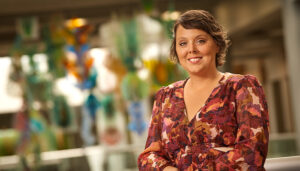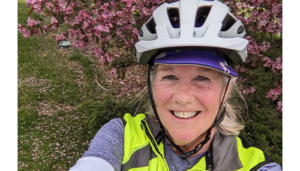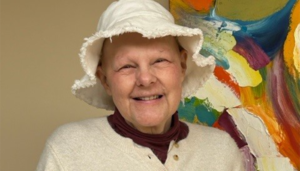Team Approach Helps “Non-Stop Runner” Slow Down To Battle Thyroid Cancer
Regina Buhs began her cancer journey with a visit to her endocrinologist, Dr. Prasuna Rao (Madhavaram) with UnityPoint Clinic Diabetes & Kidney Center.
“I went in for a diabetic check-up and Dr. Rao noticed my thyroid was enlarged,” recalls Buhs. Dr. Rao ordered a follow-up exam, then an ultrasound, which detected a thyroid nodule. In March 2017, a biopsy confirmed Buhs had papillary carcinoma—the most common form of thyroid cancer.
“At the time, we had seven kids living at home,” says Buhs, whose family has included biological, adopted and foster children. “Usually my life feels like it’s non-stop running.”
Instead, Buhs had to make time for her own health. Fortunately, she was in good hands. “I went to Dr. Rao for my diabetes, but I learned as an endocrinologist, thyroids are her specialty. And after the biopsy, she sent me to Dr. Carpenter.”
Dr. Kevin Carpenter, Physicians’ Clinic of Iowa Ear, Nose & Throat (ENT), is also an expert at treating thyroid cancer. After a CT scan showed the cancer was likely in Buhs’s lymph nodes, Dr. Carpenter performed a complete removal of her thyroid and six lymph nodes. “Dr. Carpenter was great,” says Buhs. “He told me he’s done hundreds of surgeries.”
Also helping Buhs on her cancer journey was her Nassif Community Cancer Center care coordinator, Andrea Watkinson. The care coordinator is a patient’s point of contact from diagnosis through treatment and into survivorship. Watkinson communicates with team members, patients and loved ones, connects patients with providers and services and offers education and emotional support. Buhs explains, “I talked to Andrea before and after surgery. She told me what was going on, answered my questions and even scheduled appointments for me.”
Thyroid cancer strikes men and women, but is more common in women. Because the disease does not produce symptoms early on, most cases are found, as Buhs’ was, during a routine exam, or during an imaging study performed for an unrelated reason. For most thyroid cancer patients, the outlook is excellent.
“I told my kids this is the easiest cancer to take care of,” recalls Buhs.
Because her disease was in the lymph nodes, the next step was treatment with I-131 radioactive iodine. “Based on our thyroid cancer protocols, I determine whether radiation treatment is needed,” explains Dr. Rao. “In Regina’s case, I contacted St. Luke’s Nassif Radiation Center for I-131 treatment.”
Unlike external beam radiation therapy, I-131 is administered in pill form on an outpatient basis. Prior to the treatment, patients also go on a low-iodine diet to maximize effectiveness. A follow-up full-body scan after Buhs’ treatment revealed no active cancer cells.
Buhs will repeat the scan in one year. Meanwhile, she takes replacement thyroid hormone under Dr. Rao’s care. “After my thyroid was removed, I had no energy at all,” says Buhs. “Now for the most part I feel OK. ”
She adds, “My doctors all worked well together.” Dr. Rao agrees, saying, “The ENT specialists, Radiation Oncologist and I work as a team. We developed these protocols as the best way to take care of thyroid cancer patients in our community and each have a role to play. The care coordinator is also essential in educating patients and connecting them to the right team providers at the right time. She also connects patients to the extensive services the Nassif Community Cancer Center offers to meet the unique needs of each patient.”







